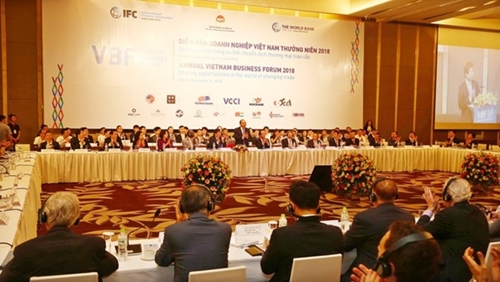VBF serves as a dialogue mechanism between the Government of Vietnam and the domestic and foreign business communities with the aim of improving business conditions to foster the development of private enterprises and provide the optimal investment environment for Vietnam’s sustainable economic growth.
    |
 |
|
Overview of the Vietnam Business Forum 2018. (Source: VGP) |
In his opening remarks, Minister of Planning and Investment Nguyen Chi Dung affirmed that despite impacts of the rapidly changing regional and global situations on the national economy, the Government has taken drastic measures to implement set targets such as stabilizing the macro economy, stepping up administrative reform, and improving the business and investment environment.
These efforts worked, with the macro economy stabilised, inflation curbed below 4 percent, and this year’s economic growth likely to surpass the set goal of 6.7 percent, Dung said.
Besides, new enterprises numbered around 130,000 in 2018, social investments was estimated at 1.89 quadrillion VND (81.27 billion USD), FDI disbursement hit 18 billion USD, and total export turnover approximated 240 billion USD.
The minister attributed the achievements to contributions by the business community and both domestic and foreign investors.
However, he pointed to several challenges still facing the nation, including inflation pressure, growth quality, labour productivity and competitiveness, climate change, and middle-income trap.
Therefore, he called on the business community to expand their engagement in the making of socio-economic development policies and in business and investment activities.
Tomaso Andreatta, Co-Chairman of the VBF Consortium, hailed positive changes the Vietnamese Government has made to create a stable business environment and encourage start-ups, citing the promulgation of Resolution No.19 on improving the business environment and national competitiveness and Resolution No.35 on supporting and developing businesses by 2020.
He said the business community has acknowledged and appreciated efforts of ministries, sectors, and localities in reducing business and investment conditions, reforming specialised inspections, and simplifying administrative procedures.
In the context of rapidly changing trade, the US-China trade tension may bring about benefits for Vietnamese enterprises, he said, advising Vietnam to seek ways to take advantage of this opportunity to maintain its economic growth.
Sharing the same view, Chairman of the American Chamber of Commerce (Amcham) in Hanoi Michael Kelly cited statistics of a recent survey on US enterprises in China as saying that one third of the respondents removed or is considering the removal of their production factories to other countries.
Meanwhile, half of foreign enterprises from other countries are considering plans to move out of China and Southeast Asia is considered as their best choice. This is a big opportunity for Vietnam, he said.
However, it is not all good to draw a lot of investment capital into the country if foreign-invested enterprises, which are accounting for over 70 percent of Vietnam’s export value, leave the country, he noted.
That is why businesses need to see continuous and visible progress of issues discussed during this VBF’s sessions, he said, proposing ineffective administrative procedures be controlled, and the legal framework and taxation be stablised and predictable.
Chairman of the Vietnam Chamber of Commerce and Industry Vu Tien Loc, who is also Co-Chairman of the VBF Consortium, stressed the need for Vietnam to step up IT application in all fields, citing that the country climbs 81 places in ease of paying taxes in the World Bank’s Doing Business 2019 thanks to the sector’s expanded IT application.
Minister Dung affirmed that the Vietnamese Government and ministries and sectors will exert more efforts to implement socio-economic development goals, improve the business and investment climate, increase the national competitiveness, step up innovations and start-ups, and attract foreign investment selectively.
The country will also pay more attention to boosting the public-private partnership in the infrastructure field, and improving education and human resources training in the digital era, he added.
Source: VNA